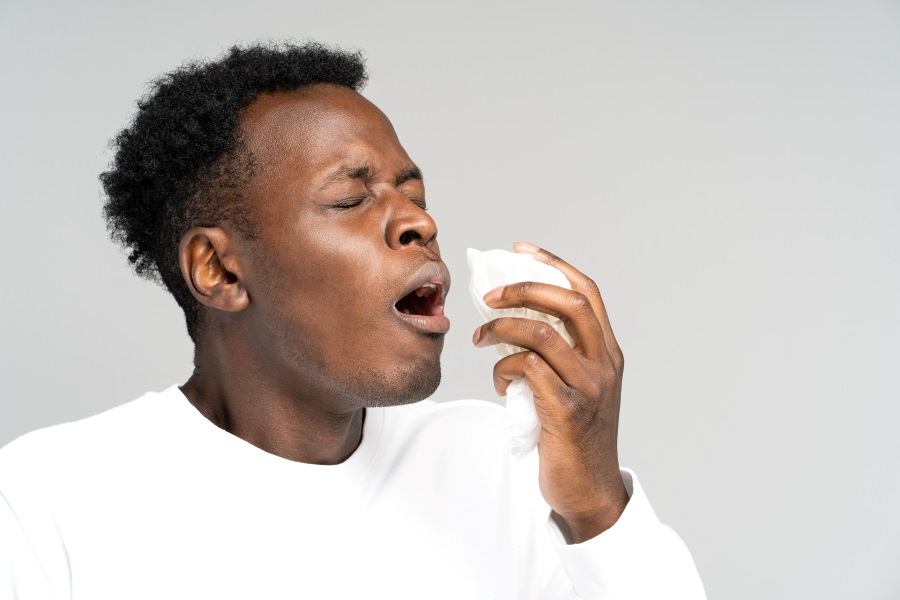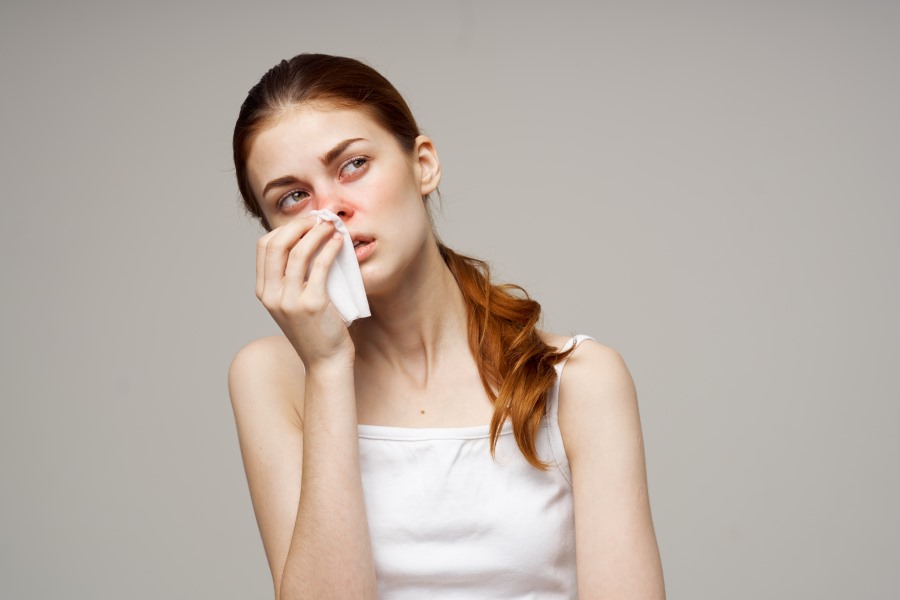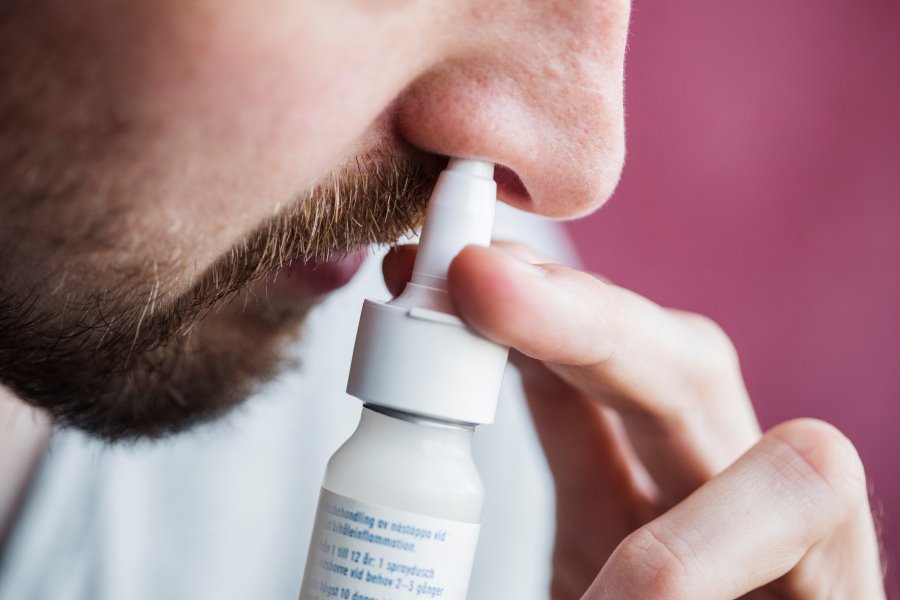Allergic Rhinitis Reaction (Nose Allergy) and its Treatment

A nose allergy is an utterly common type of allergy across the globe. Allergic rhinitis or hay fever is one of the most common types of nose allergy. It mainly occurs when your immune system reacts to specific allergens such as pollen and dust, resulting in common cold symptoms such as sneezing and nose congestion.
Do you frequently suffer from such symptoms? Then, you might be suffering from a nose allergy. Find out more about it from this article!

Table of Contents

What is a Nose Allergy?
A nose allergy occurs when your allergic reactions mainly target your nose. The tiny particles in the air called allergens are usually harmless substances unless your immune system is allergic to them. When you breathe these allergens through your nose, your body releases histamine, a natural chemical. As a result, you experience major nasal problems every time you are exposed to such allergens.
Types of Nose Allergies

Knowing the kinds of allergies that can affect the nose can help you find the necessary treatment. The following types of nose allergies are commonly seen in patients.
What are the Causes of Nose Allergies?

Now that you know what nose allergy is, you must naturally be wondering about its causes. If you have this allergy, it means that your immune system deems the allergens to be harmful to your body. As a result, it produces histamine to protect you from these allergens, which ends up causing your symptoms. Some of the common allergens causing this allergy are discussed below.
What are the Symptoms of Nose Allergies?
You will observe some nose allergy symptoms if you suffer from this condition. Here are a few common ones:
Who is at Risk of Nose Allergies?
Allergies can commonly affect anyone. However, you are more prone to developing allergic rhinitis in case of a family history of allergies. Moreover, people facing the following conditions are at a higher risk of developing this allergy.
- Asthma or eczema
- Smoking addiction
- Constant exposure to a cold and humid environment
- Air pollution in the surrounding
- Exposure to contents in hair sprays and perfumes
- Constant exposure to wood smoke, fumes and chemicals
- Repeated upper respiratory tract authors or lowed throat infections can also affect the immune system and cause a greater probability of allergy infections.
- Sleeping with cats or dogs exposes many people to the risk of nasal allergies when they wake up.
- Occupations, where people come into contact with irritants like dust agents, certain substances, and chemicals, than the risk.
- Residing in regions with high levels of pollen or some environmental allergens may pose a risk.
- Occupations, such as construction or factory work, which entails working with dust, idiopathic substances, or chemists, spell the risk.
How to Diagnose Nose Allergies?
When you observe your symptoms and visit the physician, you will be asked to do a physical examination. A skin prick test is commonly used in this context. Doctors will prick your skin with a needle and place a small quantity of different substances and allergens to check how your body reacts to these.
On the other hand, a blood test or radioallergosorbent test (RAST) is also commonly used for diagnosing this allergy. It helps to measure the current amount of immunoglobulin E antibodies in your blood in terms of particular allergens.
How to Treat a Nose Allergy?

Now, the question is, how do you treat nose allergies? There are several ways, but the following measures are frequently used.
1. Medication
If you wonder how to reduce nose allergies, medicines such as antihistamines are helpful. These prevent your body from creating histamine, thereby controlling your symptoms. Some common over-the-counter antihistamine drugs include fexofenadine, diphenhydramine, and desloratadine.
Moreover, if you deal with stuffy nose and sinus pain, doctors might suggest decongestants for a short period. However, using these for longer might result in a rebound effect, worsening your symptoms once you stop. Some of the popular decongestants include oxymetazoline, pseudoephedrine,e and phenylephrine.
2. Eye and Nasal Drops
Doctors often suggest eye drops if you face watery and itchy eyes during this allergy. Similarly, nasal sprays are also commonly prescribed for quick relief from a stuffy nose. However, these drugs also come with rebound effects. Steroid sprays are therefore used to avoid this issue. Make sure to consult our doctor before using these.
3. Immunotherapy
Another standard treatment for nose allergy comes in allergy shots or immunotherapy. These shots help improve your immune system and prevent allergic reactions. It starts with about one-shot 1-3 times a week. You might experience mild reactions after taking these shots.
4. Sublingual Immunotherapy (SLIT)
For this method, doctors ask you to place a tablet under your tongue, which consists of a mixture of various allergens. Its work process is similar to allergy shots but without involving an injection. It helps to cure rhinitis and asthma allergies to pollen and dust mites. You will need to take frequent doses of SLIT for a certain period, which your doctor determines.
How to Prevent Nose Allergies?
Finally, you must be curious to know how to prevent nose allergies. The following tips can help you with this.
- Avoid outdoor pollens by staying home during the allergy seasons
- Take frequent showers
- Keep your doors and windows closed
- Clean your home and wet mop the floors
- Use a vacuum with a HEPA filter
- Reduce exposure to stray animals
- Wash your hands immediately after touching pets
- Use hats and sunglasses while travelling
- Avoid smoking and exposure to secondhand smoke
- Use allergy-proof bedding to reduce dust mites
- Keep indoor humidity levels low to prevent mold growth
Therefore, a nose allergy can attack you when exposed to pollen, dust mites, and animal dander. This article helped you identify the types of this allergy and its symptoms. While it can be easy to diagnose and treat, it is always advisable to visit the doctor immediately once the symptoms start showing to avoid further complications. Keep yourself aware of the common symptoms and treatments to effectively combat this allergy.
Protect What Matters - Explore Other Insurance Options














